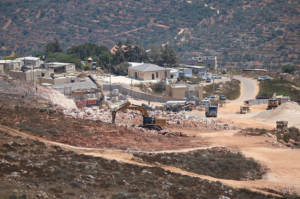The first step toward disintegrating Israel’s settler machine

Israeli bulldozers expand the West Bank Jewish-only settlement of Nofei Nehemia on private Palestinian land which was expropriated by Israel and declared ‘state’ (public) land, according to the owners, 13 August 2020
Ori Kol writes in +972 on 19 March 2024:
“Look at these bastards,” the right-wing Israeli journalist and provocateur Yinon Magal tweeted on Feb. 18. “They blocked the personal account and the access to money (!!) of Moshe Sharvit the hero, brother of Harel RIP who died in Gaza, and a Zionist who’s watching over Israeli land in the Jordan Valley. The world is upside down.”
Moshe Sharvit is one of dozens of Israeli settlers to have been hit with international sanctions in recent weeks for their involvement in violent acts against Palestinians and left-wing Israeli activists in the occupied West Bank. His record speaks for itself: in 2020, Sharvit established an outpost (“Moshe’s Farm”) in the Jordan Valley, a vast stretch of the West Bank under full Israeli military control that is home to tens of thousands of Palestinians. He frequently harasses Palestinian farmers and shepherds while they work on their land, and, since October 7, he has been busy forcibly evicting Palestinian families from the rural community of Ein Shibli.
As a result, Sharvit has had the misfortune of being blacklisted by both the United States and the United Kingdom, amid a wave of first-of-their-kind measures imposed by Western governments against Israeli settlers. U.S. President Joe Biden’s Feb. 1 executive order set the stage, announcing sanctions against four settlers. The U.K., France, Spain, Belgium, and New Zealand followed suit with variations on Biden’s list, while Canada and the EU are set to impose sanctions of their own. Last week, the U.S. announced additional measures against two West Bank outposts and three more settlers.
The sanctions, which have so far mostly targeted lower-rung activists, are two-pronged. First, they amount to a ban on entering the sanctioning country; and second, they effectively prevent the targeted settlers from accessing the mainstream financial world, barring them from using most international banking services, including Israeli ones.
Despite their relatively narrow focus, the language of the sanctions and the timing of their implementation imply that more consequential action is likely to follow. As a result, the whole settler machine could find itself facing a level of duress that it has not previously known.
Room for interpretation
Biden’s executive order leaves much room for further action, with its sights set on individuals involved in “directing, enacting, implementing, enforcing, or failing to enforce policies … that threaten the peace, security, or stability of the West Bank.” The wording here is such that the restrictions could easily be expanded to encompass far more organizations and individuals than those named so far. After all, the settlement enterprise has always been a joint project of Israel’s government, army, and legal system working in unison.
